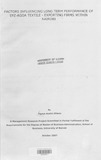| dc.contributor.author | Ogaye, Austin O | |
| dc.date.accessioned | 2013-05-10T10:08:51Z | |
| dc.date.available | 2013-05-10T10:08:51Z | |
| dc.date.issued | 2007 | |
| dc.identifier.citation | Masters of business administration | en |
| dc.identifier.uri | http://erepository.uonbi.ac.ke:8080/xmlui/handle/123456789/21256 | |
| dc.description.abstract | The textile industry in Kenya has gone through a lot of changes since the liberalization
tendencies prescribed by the World Bank under the Structural Adjustment Programmes
(SAPs) of the 1990s. Almost all the local factories closed shop unable to compete with
cheaper new and second hand imports especially from Asia. In a bid to reverse this trend,
the United States government enacted an act in May 2000 to under the auspices of African
Growth and Opportunity Act (AGOA), which encourages production of textile products in
developing economies of Africa and Asia.
In Kenya, these outfits have been operating within export processing zones (EPZs) where
they enjoy certain concessions from the government such as tax holidays. With the
extension of the act constantly under threat, there has risen a need to find out what
strategies these firms employ in order to maintain their operations in the global market. The
focus of the study is on factors influencing long-term performance of EPZ-AGOA textile
exporting firms within Nairobi. These findings will definitely help the policy makers and
stakeholders within the industry with future strategies on policy formulation geared at
managing and planning for the long term. | en |
| dc.description.sponsorship | University of Nairobi | en |
| dc.language.iso | en | en |
| dc.title | Factors influencing long-term performance of EPZ-AGOA textile - exporting firms within Nairobi | en |
| dc.type | Thesis | en |
| local.publisher | school of Business, University of Nairobi | en |

